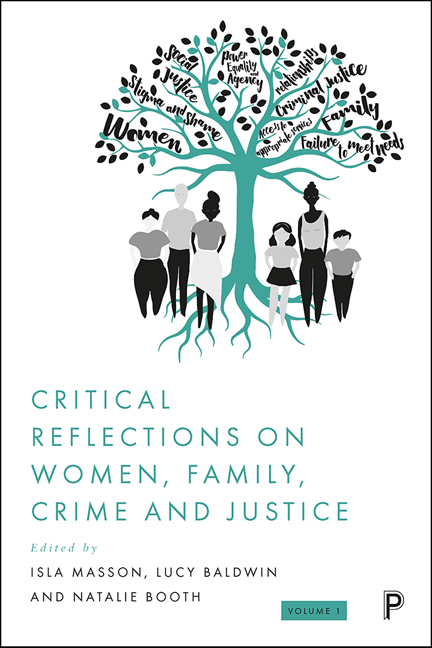Book contents
- Frontmatter
- Contents
- List of figures
- Notes on the contributors
- Acknowledgements
- Foreword: critical reflections from the Women, Family, Crime and Justice network
- 1 Starting the conversation: an introduction to the Women, Family, Crime and Justice network
- 2 Playing the game: women and community punishment
- 3 Harmful social and cultural practices that exist within South Asian communities in the UK and their impact on women
- 4 Exploring shame, love and healing within women’s recovery: an analysis of a trauma-specific intervention
- 5 Reducing the enduring harm of short terms of imprisonment
- 6 ‘Without it you’re lost’: examining the role and challenges of family engagement services in prisons
- 7 What are the challenges and opportunities for schools in supporting children of people in prison?
- 8 Impact and engagement work in the context of families of people in prison
- 9 Presence, voice and reflexivity in feminist and creative research: a personal and professional reflection
- 10 Service users being used: thoughts to the research community
- 11 Continuing the conversation: reflections from the Women, Family, Crime and Justice network
- Index
3 - Harmful social and cultural practices that exist within South Asian communities in the UK and their impact on women
Published online by Cambridge University Press: 21 December 2021
- Frontmatter
- Contents
- List of figures
- Notes on the contributors
- Acknowledgements
- Foreword: critical reflections from the Women, Family, Crime and Justice network
- 1 Starting the conversation: an introduction to the Women, Family, Crime and Justice network
- 2 Playing the game: women and community punishment
- 3 Harmful social and cultural practices that exist within South Asian communities in the UK and their impact on women
- 4 Exploring shame, love and healing within women’s recovery: an analysis of a trauma-specific intervention
- 5 Reducing the enduring harm of short terms of imprisonment
- 6 ‘Without it you’re lost’: examining the role and challenges of family engagement services in prisons
- 7 What are the challenges and opportunities for schools in supporting children of people in prison?
- 8 Impact and engagement work in the context of families of people in prison
- 9 Presence, voice and reflexivity in feminist and creative research: a personal and professional reflection
- 10 Service users being used: thoughts to the research community
- 11 Continuing the conversation: reflections from the Women, Family, Crime and Justice network
- Index
Summary
Introduction
Since 1947 there has been an influx of South Asian migrants to the UK for different reasons. Some of this has been motivated by a need to escape civil war, to seek better economic opportunities, for marriage or to join family members. According to the 2011 census, South Asians represent the largest minority group in Britain. Many of these migrants have settled in the UK and are contributing to economic, social and political life (Girishkumar, 2014). Despite the apparent assimilation of South Asian migrants into the UK and their relatively large number, South Asian women migrants in particular continue to face multiple disadvantages. These disadvantages include language barriers, lack of education, lack of skills, poor quality housing, unemployment (Girishkumar, 2014) and specific forms of violence associated with the various cultural and religious practices that define their identity (Raj and Silverman, 2002; Anitha, 2008). These increase the gender-based power imbalance, thereby reinforcing the patriarchal structures of both the host and migrant cultures, which leads to the further marginalisation and victimisation of women (Anitha, 2008; Girishkumar, 2014).
Patriarchy is a system of society in which men hold power and women are largely excluded from it. It is an ideology that is considered to be a major deciding factor when mapping the gender power relations that exist within a society (Anitha, 2008; Girishkumar, 2014). It is suggested that patriarchal structures, combined with other intersecting components such as class, race, culture, religion and family patterns, contribute to the context within which abuse occurs (Gilligan and Akhtar, 2006; Ganeshpanchan, 2017) and oppress women.
Even though patriarchy is considered to be a universal phenomenon, it can intensify depending on the region and culture in which it is practised (Hapke, 2013). In South Asian communities, its manifestation can be widespread, playing a central role in the way women's lives are defined and subjugated (Prasad, 1999; Johnson and Johnson, 2001; Niaz, 2003; Girishkumar, 2014). This chapter, informed by a participatory action research approach (O’Neill, 2006), discusses some of the cultural practices that exist among the South Asian communities living in the UK that negatively impact women and girls.
Methodology
The methodology adopted was qualitative and included a range of face-to-face and telephone interviews, as well as focus groups over a period of 36 months with 107 female survivors of violence from South Asian backgrounds living in Leicester and Leicestershire.
- Type
- Chapter
- Information
- Critical Reflections on Women, Family, Crime and Justice , pp. 35 - 56Publisher: Bristol University PressPrint publication year: 2021

